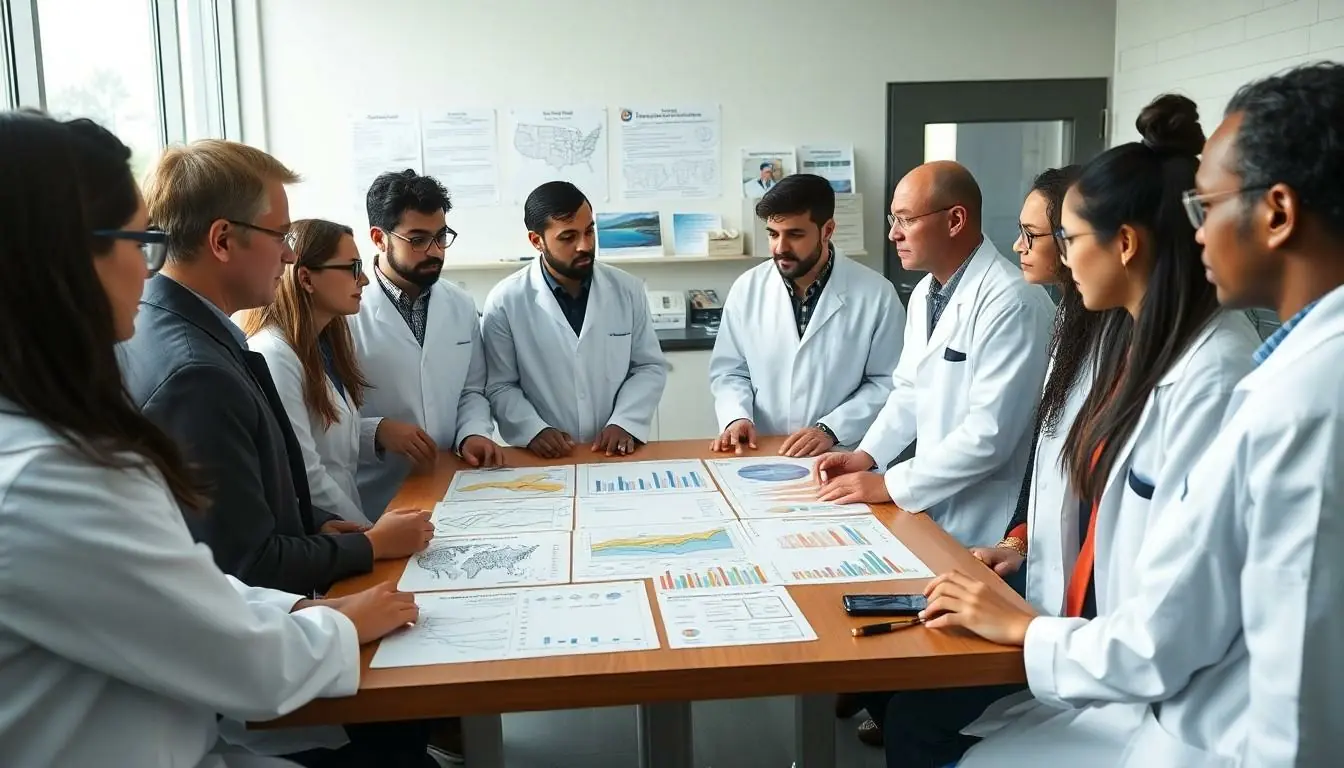Global climate change is the hot topic that’s got everyone buzzing—literally! With rising temperatures and extreme weather making headlines, it’s no wonder people are searching for answers. But with so many theories floating around, it can feel like trying to find a needle in a haystack. Which theory holds the most water?
Table of Contents
ToggleOverview of Global Climate Change Theories
Numerous theories attempt to explain the complexities of global climate change. The greenhouse gas theory stands out as the most widely accepted explanation. This theory argues that human activities, such as burning fossil fuels, release significant amounts of carbon dioxide and methane into the atmosphere. These gases trap heat, leading to a gradual increase in global temperatures.
Another theory focuses on natural cycles in Earth’s climate system. It highlights the role of solar radiation and volcanic activity in influencing climate patterns. While these factors play a part, they cannot account for the rapid changes observed since the mid-20th century.
The carbon cycle theory emphasizes the interactions between carbon reservoirs on the planet. It details how carbon moves between the atmosphere, oceans, soil, and living organisms. Disruption of this balance due to human activity has significant implications for climate stability.
The ocean circulation theory centers on the importance of ocean currents in regulating temperatures. Oceans absorb a large portion of heat and carbon dioxide, but changes in circulation patterns can lead to regional climate shifts. This theory has gained traction in recent discussions on climate variability.
Scientific consensus supports the human-induced climate change theory, aligning with data from organizations like the IPCC. Multiple studies underscore the link between human activities and rising temperatures. Skepticism remains, often fueled by misinformation, but the overwhelming body of evidence highlights the urgency of addressing climate change.
Researchers continue to investigate climate feedback mechanisms, enhancing understanding of these interconnected theories. As clarity emerges, the focus shifts toward actionable strategies to mitigate impacts.
Major Theories Concerning Global Climate Change

Several theories exist regarding global climate change, each attempting to explain its complexities. The greenhouse gas emissions theory shows significant support within the scientific community.
Greenhouse Gas Emissions Theory
This theory focuses on human activities, notably the combustion of fossil fuels, which release greenhouse gases. Carbon dioxide and methane, among other gases, trap heat in the atmosphere, contributing to the ongoing rise in global temperatures. According to the Intergovernmental Panel on Climate Change (IPCC), evidence strongly links these emissions to climate change. As industrialization continues, experts see a direct correlation between emissions levels and temperature increases. By recognizing this relationship, scientists emphasize the urgency of reducing greenhouse gas outputs.
Natural Climate Variability Theory
Natural fluctuations in climate also play roles in global temperature changes. This theory considers factors like solar radiation and volcanic eruptions, which can alter climate patterns on a short-term basis. Solar activity influences Earth’s energy balance, while volcanic eruptions release aerosols, temporarily cooling the atmosphere. These natural events occasionally mask the long-term trend of warming caused by human intervention. Understanding this theory requires acknowledging both natural variability and anthropogenic influences as critical elements in climate discourse.
Anthropogenic Climate Change Theory
This theory asserts that human activities are the primary drivers of recent climate change. Industrialization, deforestation, and agricultural practices contribute to altering the Earth’s climate system significantly. The body of research supporting this theory has grown over the past few decades, illustrating how human actions disproportionately affect climate patterns. Organizations like the IPCC consistently highlight anthropogenic factors as the leading cause of observed temperature changes. This recognition of human impact leads to increased focus on mitigation strategies that address detrimental environmental effects.
Criteria for Acceptance of Theories
The acceptance of theories concerning global climate change hinges on several critical factors. Key among these are scientific consensus and empirical evidence, which pave the way for broader acknowledgment of specific theories.
Scientific Consensus
Scientific consensus plays a vital role in determining the acceptance of climate theories. Experts from various fields, including climatology, environmental science, and meteorology, reach agreement on human-induced climate change. The Intergovernmental Panel on Climate Change (IPCC) reports that over 97% of climate scientists support the greenhouse gas theory, linking human activities to global warming. A unified voice among scientists helps inform policymakers and the public. This consensus strengthens the credibility of the anthropogenic climate change theory, despite persistent skepticism.
Empirical Evidence
Empirical evidence serves as the backbone of accepted climate theories. Data collected from diverse sources boosts the validity of the greenhouse gas theory. Observations from ice cores indicate significant increases in carbon dioxide levels coinciding with industrial activities. Satellite imagery highlights temperature rise patterns aligning with increased greenhouse gas emissions. Research studies continuously reinforce the connection between rising temperatures and human actions. This solid foundation of empirical evidence enhances the credibility of theories related to climate change and fosters informed discussions on mitigation strategies.
Current Perspectives on Climate Change Theories
The dialogue surrounding climate change theories emphasizes the need for clarity and consensus. Examining varying perspectives sheds light on current scientific understanding.
Global Scientific Community’s View
The global scientific community overwhelmingly supports the greenhouse gas theory, with over 97% of climate scientists affirming human influence on warming. Strong empirical evidence, such as data from ice cores and satellite observations, underscores the relationship between elevated greenhouse gas levels and rising global temperatures. Regular assessments by the Intergovernmental Panel on Climate Change reinforce this consensus, showcasing the urgency to address emissions. Leading researchers focus on intricate feedback mechanisms within the climate system, enhancing comprehension of complex interactions. Consistent findings from independent studies strengthen the credibility of this prevailing theory, prompting discussions around effective mitigation strategies.
Public Perception and Influence
Public perception of climate change theories varies widely and often reflects misinformation. While many individuals acknowledge climate change, skepticism persists due to conflicting narratives. Polls indicate that awareness of human-driven warming is increasing, yet misconceptions about scientific consensus remain. Media portrayals significantly shape beliefs, affecting attitudes towards environmental policy. Educational initiatives targeting misinformation aim to bridge gaps in understanding. Engaging communities through transparent communication fosters informed dialogue. Activism and advocacy steadily raise awareness, influencing policy discussions and public sentiment regarding climate actions.
The greenhouse gas theory stands as the most widely accepted explanation for global climate change. With over 97% of climate scientists endorsing this theory it highlights the significant role of human activities in driving climate shifts. The strong empirical evidence supporting this theory reinforces its credibility and urgency in addressing climate issues.
While alternative theories exist they often lack the same level of consensus and supporting data. As the scientific community continues to investigate the complexities of climate change the focus remains on actionable strategies to mitigate its impacts. Public understanding and awareness are crucial in fostering informed discussions and encouraging proactive measures against climate change.




